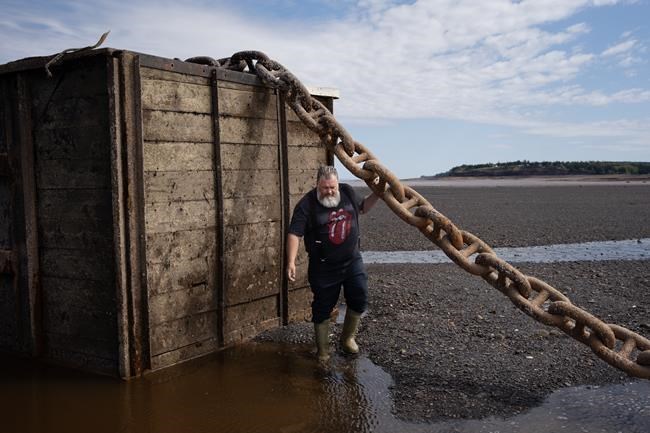
Darren Porter, a local fisherman and marine conservationist, walks around one of four shipping containers chained to the ocean floor at low tide in the Bay of Fundy off the coast of Walton, N.S. on Tuesday, September 10, 2024. The massive refuse was left behind in the Minas Basin when Occurrent Power, formerly BigMoon Power, filed for bankruptcy after failing to harness the powerful tides of the Bay of Fundy to generate electricity. THE CANADIAN PRESS/Darren Calabrese
Republished September 12, 2024 - 7:58 AM
Original Publication Date September 12, 2024 - 1:01 AM
WALTON, N.S. - Four boxcars filled with concrete are sitting on the floor of the Bay of Fundy near Walton, N.S., where residents are worried the debris — abandoned by another failed tidal power project — has become a hazard to local fishers.
In May 2023, massive air bags were used to float the rail cars to the mouth of Walton's harbour, an area where about 20 to 30 recreational fishers pass through daily as they seek flounder and highly prized striped bass.
An unusual scene emerges every time the bay's record-setting tides recede to reveal the hulks, along with massive chains that were supposed to be used as moorings for Occurrent Power's experimental tidal turbine.
The company, formerly BigMoon Power, was planning to move the anchors to a testing site on the other side of the Minas Basin. But last week, news broke that the company had filed for bankruptcy.
That's left locals wondering whether the company's $20,000 deposit with the province will be enough to pay for a proper cleanup.
Meanwhile, the boxcars disappear underwater every time the tide comes in, rising 21 feet in the harbour.
"There's nothing there now to indicate where these containers are," said Barb Gould, a recreational angler who fishes the area with her husband. "To get out of the harbour and into the main basin, you either have to go over them or around them ... I'm afraid there's going to be an accident."
She said she has been asking the provincial Natural Resources Department, the coast guard and Transport Canada to do something about the treacherous garbage.
As he looks out at the site from a local park, retiree Ron Burbidge says the debris has soured him on the emerging tidal power industry and its demonstration projects.
"It's a waste of government money, if you ask me," he said, referring to the millions of dollars provided by provincial and federal governments.
The currents that propel the world's highest tides are so strong they have largely thwarted decades of work aimed at harnessing their awesome power.
On Nov. 22, 2016, politicians and local dignitaries gathered on the other side of the Minas Basin for a low-key ceremony that saw North America’s first in-stream tidal turbine linked to Nova Scotia’s electricity grid.
There's been a string of failures since then.
In 2018, Paris-based Naval Energies’ decided to pull funding from Dublin-based subsidiary OpenHydro, the key backer of Nova Scotia’s Cape Sharp Tidal. The company left a 1,300-tonne tidal turbine stranded on the bottom of the bay and it hasn't moved since.
Last year, Sustainable Marine Energy — based in the United Kingdom — also shut down, with estimated losses of more than $30 million.
Burbidge said he worries taxpayers will be stuck with the cleanup bills.
"I think they should go out and retrieve the rail cars .... They should be taken out of there before someone gets hurt," he said.
Tory Rushton, Nova Scotia's natural resources minister, said the provincial government will “have to evaluate how we approach this" when asked last week about removing the boxcars.
Transport Canada spokeswoman Hicham Ayoun said in an email that the federal department has determined the cars "may pose a navigational hazard to boaters in the area."
As well, navigational warnings have been issued by the coast guard and there are plans to mark the containers with cautionary buoys, she said.
Executives with Occurrent didn't respond to emails or texts seeking an interview.
Darren Porter, a fisher and marine conservationist who gave permission to Occurrent to use his land to bring the freight cars into the harbour, said he wants the province to take action.
At low tide, standing beside one of the giant chains that hang from the top of one of the rail cars, he warned that a tragedy is almost inevitable if nothing is done.
"This was supposed to be a temporary thing .... Now that they're here, with no plan to move them ... somebody's going to potentially get hurt or die," he said.
"I'm hoping the province steps up and does the right thing and either moves these out of here or takes us up on our offer to move them in (to the harbour) and build a wharf in Walton, and let's move forward in a more wholesome, educated and wise manner."
Meanwhile, Gould says she's still making calls to see if warning buoys can be installed as a plan for permanent removal proceeds. "I think they're all passing it one to another," she said.
This report by The Canadian Press was first published Sept. 12, 2024.
News from © The Canadian Press, 2024